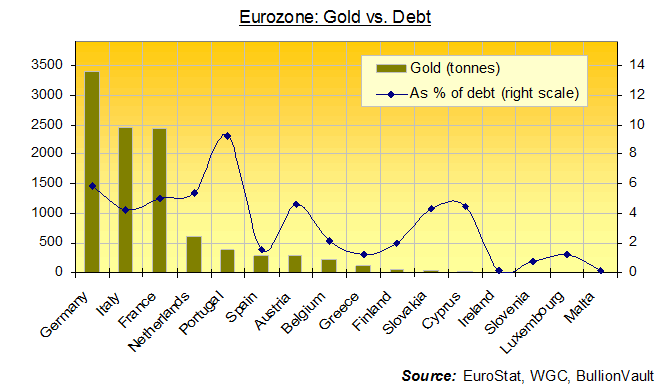EuroZone Selling Gold to Save the Euro
Commodities / Gold and Silver 2010 May 12, 2010 - 12:16 PM GMTBy: Adrian_Ash
 Is the Eurozone one final U-turn away from a 20-fold rise in gold prices...?
Is the Eurozone one final U-turn away from a 20-fold rise in gold prices...?
HAPPY SELLERS a decade ago when gold hit rock-bottom, might the Eurozone states now sell gold at all-time highs to help settle government debt today?
Doubt it. Here's why...
Lumped together, the 16 Eurozone nations (including the ECB) hold almost 11,000 tonnes of gold between them (10,797) – more than three times the central-bank hoard in Asia (3,008 tonnes) and greater again than the United States' world-beating stash of 8,133 tonnes.
But even at today's record-high prices, selling the Eurozone's entire stock of gold wouldn't cover the (first) €440 billion they've pledged to each other in cross-border loan guarantees (€338bn at Wednesday's PM Fix). And it would barely dent the real problem – the union's €7 trillion debts...

Had the 16 Eurozone states, together with the ECB, placed an order through their London dealers to "sell at the Fix" on Wednesday afternoon, gold's new record high would have helped, but not much.
Wednesday saw the London Gold Fix in Euros hit a record €974.41 an ounce. But at that price, even the Eurozone's collective gold hoard – the world's largest, remember –would have equaled less than 4.7% of the Eurozone's collective €7 trillion in debt.
Going alone, Portugal would do best (9.3%). The Big Three (of Germany, Italy and France) could settle just over 5% of their respective debt burdens.
Outside the Eurozone – but inside the EU-27, and thus exposed to the Eurozone's debt crisis – Bulgaria and Romania (40 and 103 tonnes) might think their gold hoards better used as cash than as metal (23% and 11.5% of national debt respectively). Whereas the United Kingdom, despite being Europe's sixth-largest gold hoarder, joins the Czech Republic, Estonia, Hungary, Ireland, Malta and Slovenia in being able to pay less than 1% of its national debts with its gold reserves.
Please note: This is all entirely frivolous, of course. Desperate leaders may do desperate things, but selling gold at a time of crisis won't be one of them – especially when, as shown above, it would prove futile...and especially after they made a policy, a decade ago, of selling at the bottom instead.
Perhaps, as BullionVault suggested to TheStreet last week, the Eurozone might pledge its gold as collateral for IMF loans – a move that would, in fact, only accelerate the re-monetization of gold...mobilizing its value, not denting it, by pawning it rather than selling.
But to pay off Europe's debts in full, the gold price in Euros would need to reach above €20,344 an ounce. And such a 20-fold gain would most likely mean the ECB had taken that final U-turn, agreeing to swap newly-printed money for government bonds and thus devaluing the currency to devalue its debt.
The equivalent Dollar gold price, by the way, needed to settle the US Treasury's debts with its current gold hoard, would be $47,080 an ounce. And again, selling gold to repay the national debt would require the same expedient first:
Runaway inflation in gold prices, fuelled by ever-more money creation.
By Adrian Ash
BullionVault.com
Gold price chart, no delay | Free Report: 5 Myths of the Gold Market
Formerly City correspondent for The Daily Reckoning in London and a regular contributor to MoneyWeek magazine, Adrian Ash is the editor of Gold News and head of research at www.BullionVault.com , giving you direct access to investment gold, vaulted in Zurich , on $3 spreads and 0.8% dealing fees.
(c) BullionVault 2010
Please Note: This article is to inform your thinking, not lead it. Only you can decide the best place for your money, and any decision you make will put your money at risk. Information or data included here may have already been overtaken by events – and must be verified elsewhere – should you choose to act on it.
© 2005-2022 http://www.MarketOracle.co.uk - The Market Oracle is a FREE Daily Financial Markets Analysis & Forecasting online publication.



